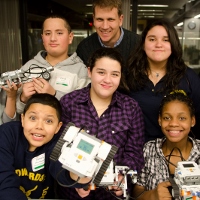Help Every Student Succeed!
The Every Student Succeeds Act (ESSA), signed into law by President Obama on December 10, 2015, keeps important accountability components, such as disaggregating and reporting data on student subgroups, but does away with one-size-fits-all federal requirements. Overall, ESSA calls on states, districts, and schools to offer ALL students a well-rounded education through increased flexibility over accountability systems and funding, and provides an opportunity for deeper engagement with families and community-based organizations. We are calling state education leaders into action to leverage the flexibility in ESSA to call for innovation and alignment of our education system to a 21st Century global economy by expanding learning time, making learning more relevant, and involving citizens and residents of this country in the shared enterprise of education. Only by critically rethinking and boldly re-imagining the basic structures of education, can we advance our educational system and develop a workforce that is prepared to meet the challenges of the global age.
In 2015, we formed the Expanded Learning Middle School initiative along with 19 other national, state, and local groups committed to education and child and youth development, with a particular focus on expanding learning opportunities through creative school designs and out-of-school-time programs. Collectively, we represent thousands of educators, parents, children, private-sector donors, volunteers, and community-based advocates. We firmly believe that all students—regardless of income or background—need access to high-quality, real-world learning opportunities and mentorship that will help put them on a path to success.
We are proud that our partnerships with schools, companies, and national service programs are contributing to student learning in unique and effective ways, which will have long-term impacts on students’ life trajectories and contributions to society. Students we serve have rapidly increased their learning and academic growth during their elementary and middle school years, entered high school more prepared for success, and enrolled in college at rates higher than their peers. Moreover, the staff from Citizen Schools and many of the other organizations have enjoyed careers as teachers, school and district leaders, researchers and policymakers.
Core to our beliefs is that all children need to be inspired through their education and surroundings to develop the necessary academic and social and emotional skills—such as growth mindset, resilience, and self-management— to be college and career ready. Yet income and background often limit access, especially to high-quality programs. For instance, upper-income families have tripled their investment in their children’s education in a generation—amounting to a gap of 6,000 hours of extra learning by 6th grade. Lower-income children count on public schools, even though most students only spend 20% of their waking hours in the classroom. To shift this trend, schools and community organizations like ours across the country are collaborating to expand learning opportunities for low-income students, with a special focus on the critical, but often neglected, middle school years.
Studies show that expanding time and opportunities for student learning has an impact on student achievement—particularly for at-risk students. By expanding the learning day and creating summer learning opportunities, more students can have access to academic support, enrichment activities, and mentoring. Recent research has also found that afterschool programs contribute significantly to the development of skills required to thrive in the 21st century, like problem solving, communication, and teamwork. These skills, such as leadership, effective communication, and teamwork, are essential to supporting college and career readiness among students and ensuring they are prepared for life. Please see appendix for resources on evidence of the impact of expanded learning time (ELT).
Congress included ELT[1] in several sections of ESSA. This is a milestone for our students and school communities, as the new law represents the biggest commitment the federal government has made to ELT. ESSA sets conditions that will help schools and community partners sustain and grow expanded learning opportunities around the country.
As state education departments begin their ESSA state planning, we ask that they engage a diverse group of community partners on the front end of your planning process. We believe that state and local leaders are best served by designing a process that includes community stakeholders—such as educators, parents/families, young people, local government, community-based organizations, higher education institutions, philanthropy, private sector, faith-based institutions—that offer assets and expertise that can support the education of our young people. Below is a list of programs and provisions in ESSA that different states can leverage to grow and sustain expanded learning.
For any questions, please contact Roxanne Garza at roxannegarza@citizenschools.org.
[1] The official federal definition of “ELT” can be found in Title VIII “General Provisions”—”The term ‘expanded learning time’ means using a longer school day, week, or year schedule to significantly increase the total number of school hours, in order to include additional time for— ‘(A) activities and instruction for enrichment as part of a well-rounded education; and (B) instructional and support staff to collaborate, plan, and engage in professional development (including professional development on family and community engagement) within and across grades and subjects.”











